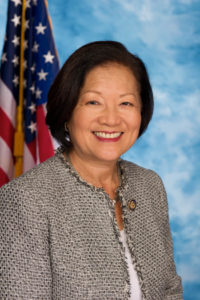
By Olivia Wolf
AsAmNews Staff Writer
The 35,000 international adoptees who were not covered by the Child Citizenship Act of 2000 are now one step closer to becoming legal citizens of the United States.
Members of the Adoptee Rights Campaign (ARC), Senator Mazie Hirono (D-HI), and Representative Adam Smith (D-WA) hosted a briefing on Wednesday in Washington, D.C. regarding the reintroduction of the Adoptee Citizenship Act for over 40 members of Congress and supporting organizations.
Former Representative Bill Delahunt, who led the effort to pass the Child Citizenship Act, confirmed that it was a legal loophole that failed to grant citizenship to adoptees who were over the age of 18 when the bill passed, according to a press release.

It was never Delahunt’s intention that thousands of adoptees who came to the United States as children would face difficulty securing employment, healthcare, and government IDs. Certainly, it was not expected that these children of American parents would be threatened with deportation.
During the briefing, presentations from the South Korean government highlighted the struggles that deported adoptees face as they attempt to integrate into a country where they don’t understand the language or culture. Many of these adoptees have no known family members in their birth country and were forced to leave their spouses and children back in the United States.
The Adoptee Citizenship Act would remedy these issues by granting American citizenship to all adoptees who came to the United States legally as children.
According to Joy Alessi, a Korean adoptee and co-director of the ARC, gaining momentum for the bill under the Immigration and Nationality Act has been slightly challenged by the contentious political climate surrounding immigration.
However, as Alessi explained to AsAmNews, “This is really not an immigration issue. Immigration is just one component in the process of adoption. This issue is really about family permanency.”
The original Child Citizenship Act of 2000 maintained bipartisan support and travelled through the legislative process with few obstructions. Both Republicans and Democrats have already demonstrated tremendous support for the new Adoptee Citizenship Act, according to Alessi.

The ARC is hoping that the contents of the Adoptee Citizenship Act remain the same as the first version that failed to pass in the 114th Congress (2015-2016). If the components of the awaited draft look acceptable, the organization is hoping to see the bill introduced by the end of the month.
The enactment of the Adoptee Citizenship Act would bring long awaited relief to thousands of adoptees like Sarah, co-founder of the ARC, who shared her story at the briefing on Wednesday.
Sarah, who uses an alias to protect her job, came to the United States from Iran in 1973 when she was adopted at two years old by an American family. It wasn’t until she attempted to apply for a passport in 2008 that Sarah discovered she never officially received American citizenship. Her mother claimed to have completed the necessary paperwork, but believes immigration didn’t file it properly.
Upon this discovery, Sarah contacted a lawyer who advised her to do nothing and continue living her life, albeit quietly. However, with the recent increase in stories of deportations in the news, Sarah started to fear for her future. She began taking steps to secure her residency and obtain a green card. However, the process was more complicated than she imagined.
“At that point I realized I needed to do something–I couldn’t just hide,” Sarah told AsAmNews. “So, I had my mom sponsor me as an alien resident. Basically, I am now being asked to immigrate from Iran. It’s as if my mom lives here, and she is sending for me in Iran.”
“Now I’m waiting for my visa, and visas are backlogged by 10 years,” continued Sarah. “Additionally, Iran is now on the travel ban, so I’m unsure how that will affect me.”
Sarah considers herself to be “stateless,” and she told AsAmNews that she has had difficulty obtaining information on her legal status from the government. Neither she nor her family ever expected that she would end up in this position.
“My parents adopted me from an orphanage in order to give me a wonderful life.” she explained. “My dad passed away when the Child Citizenship Act went into effect, and he thought I was on a good path. I had received an education and had a successful career. My parents had given me so much, and then it was taken away.”
Sarah says that policymakers have displayed warmth and empathy to her. “Not being allowed to vote as a citizen made me feel like democracy was taken away from me, but sharing my story and being a part of this process has restored that. It would mean the world to me if Congress would listen to us and turn this bill into a law.”
AsAmNews has Asian America in its heart. We’re an all-volunteer effort of dedicated staff and interns. You can show your support by liking our Facebook page at www.facebook.com/asamnews, following us on Twitter, sharing our stories, interning or joining our staff.

